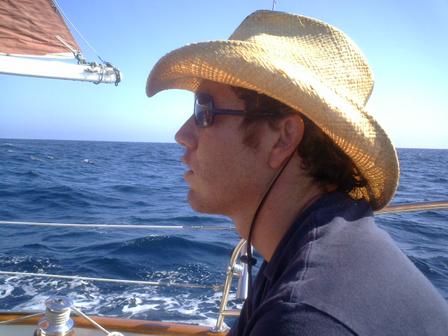By: Ben Tiernan
Lupe inspected the play of shadow and light on her brother’s ashen face. She imagined a great fire in the distance casting red flashes across the trembling boxcar then drowning the room in shadow. The crimson morning sun revealed the nimbus of wild poinsettias as they passed her window. The air was still and thick with golden dust.
The year was 1919. Lupe was eight years old. Carranza ran the post revolutionary government, and Lupe, along with her brothers, Carlos and Condi; her oldest sister, Virginia; her sister Chayo; and fourteen other children from Culiacan were en route - north - to the United States boarder. At the head of this youthful army was Lupe’s mother, Beatrice.
Lupe watched her brother Carlos quietly. His eyes were closed and his blond hair fell across his face. The windowsill supported the weight of his head, and his slight body jerked as they crossed over the rail ties.
Carlos had been out all night with the other young men, and he was extremely tired. Beatrice scolded Carlos when he arrived at the train station happy and disheveled. She chastised him for his drunkenness and for jeopardizing their departure. Carlos suffered the tirade and winked at Lupe who peeked from behind her mother’s dress.
After the scolding, Carlos disappeared again. A throng collected as the children of the region awaited the train. The revolution had separated many families, and young children were joining their parents who had settled in the States, and older children were striking out to find work and prosperity.
Lupe’s oldest brother Leocadio was twenty, and he would stay back and tend to the ranch. He and Carlos had come under fire from bandits and revolutionaries while riding fences. The revolution was over, but there was no stability and the threat of violence to Beatrice and her children had driven them from their home.
Lupe bravely triumphed over her fear of the train. A fierce tremor preceded its arrival followed by a deafening cacophony of squeals, bumps, and thunder. Finally, out of a ragged cloud of ferocious steam, emerged the engine which struck Lupe as frighteningly biological – a steel Titan.
Inside the boxcar, she became ecstatic and completely overcome by the novelty of train travel. Everything about it was uncommon, modern, and exciting. Lupe believed that the elegance of her exodus set a precedent for her new life in the North. She waited in the car while Beatrice corralled children and fretted over Carlos who was still lost in the throng.
At last, the trumpets blazed, and a chorus of young mariachis stepped forward from the crowd. They were Carlos' gang of friends, and he stood proudly by them as they serenaded Beatrice and her travelers. Leocadio and Carlos stood side by side while the mariachis sang, until Carlos loaded the last of the traveling chests, and took his seat across from Lupe.
Beatrice cried and accepted the good fortune and gratitude of the families who gave their children into her charge. She held Leocadio until his pride gave way and he succumbed to her embrace. When she boarded the train, she carried a heavy wooden jewelry box filled with silver – enough, possibly, to finance their new beginning.
As the train pulled away from the station, Lupe heard the mariachis play her favorite waltz: Las Barcas De Guiymas.
Subscribe to:
Post Comments (Atom)

No comments:
Post a Comment